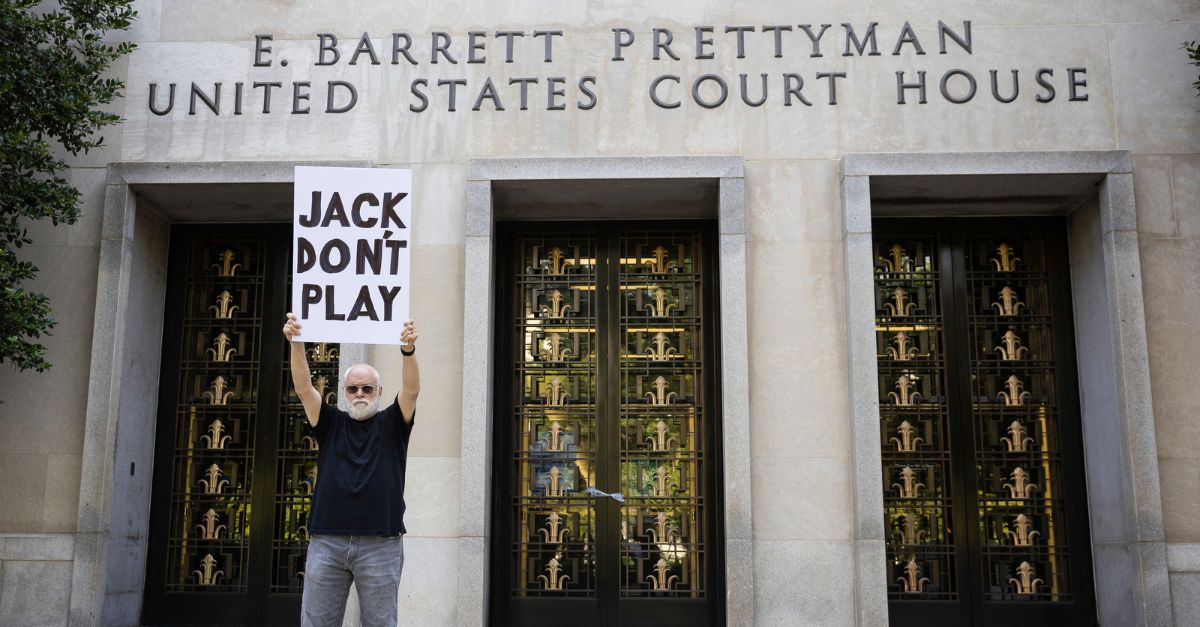
Background: Washington, D.C. area resident Bill Christeson demonstrates outside the E. Barrett Prettyman U.S. Courthouse in Washington, D.C., Aug. 11, 2023 ahead of a hearing on a protective order sought by special counsel Jack Smith relating to his case against former President Donald Trump for attempting to overturn the 2020 election. (Francis Chung/POLITICO via AP Images)
Former President Donald Trump‘s “continued use of social media as a weapon of intimidation in court proceedings” prompted prosecutors working under special counsel Jack Smith on Tuesday to request that the federal judge overseeing his election subversion case in Washington, D.C., set down a series of protective measures for prospective jurors.
Prosecutors also filed a motion opposing plans they believe the former president has to rely on something known as an “advice-of-counsel” defense that could potentially throw the existing trial schedule out of order and delay the existing March 4, 2024, trial date set by U.S. District Judge Tanya Chutkan earlier this year.
On the juror protection issue, prosecutors argue that because of concerns they have that the former president may inappropriately contact prospective jurors during the selection process, it would be a prudent if the court ordered a jury questionnaire in advance of the actual selection process. This way, the court orders a draft of the questionnaire — used to evaluate fairness and bias — then both the defense and prosecution can hash out the questions they agree or disagree on and the judge would issue a final version.
Prospective jurors would need to complete that questionnaire in person before selection officially begins on March 4, the trial’s formal opening day in Washington, D.C.
Given the complexity of the case, the uniqueness of the charges and the visibility of the defendant, and Trump’s own running public commentary about the charges, the questionnaire completion alone could take days or weeks, Smith argued. By doing it in advance, with a deadline set of Feb. 9, 2024, to complete it, that would mean that the March trial date for in-person jury selection could go off without a hitch.
Defense attorneys would also have a full week before the trial began, Smith noted, to provide a list of jurors they would want to strike for cause, but only on terms based on the questionnaire.
But the real effort to protect jurors for now, short of sequestering them or ordering they remain anonymous, could come by way of setting down ground rules for how prosecutors and defense attorneys vet jurors on social media.
Trump has a “record of using public social media platforms in an intimidating matter,” and did so just last week in New York, Smith wrote, referring to Trump’s lashing out at a presiding court clerk and judge in the New York State Supreme Court where he is on trial for fraud.
It is commonplace in the Washington-based district court for attorneys to conduct open-source social media searches of potential jurors once given their identifying information. This, in fact, occurred in other high-profile Jan. 6 cases including the seditious conspiracy cases of the Oath Keepers and Proud Boys.
While social media vetting is standard, Smith asked Chutkan to go a step further to shield jurors from any possible harassment by Trump.
“The court should make clear to the parties … that research beyond what is publicly available — especially if it results in any kind of contact with a potential juror — would infringe upon potential jurors’ privacy interests and could constitute improper ex parte communication,” the motion states.
Jurors are not celebrities nor public figures, Smith continued.
“Their privacy matters. Their privacy should yield only as necessary to reveal bias or a reluctance to follow the court’s instructions,” he wrote.
Therefore, the court should declare that no parties — neither prosecution nor defense — should be able to “‘follow’ or ‘friend’ anyone, or make any analogous affirmative request, to gain access to posts or profiles that are not otherwise publicly available,” the filing states.
Further, there should be a ban on “any form of investigation — whether online or otherwise — that could reasonably be perceived as vexatious or harassing,” Smith wrote.
Read Related Also: ‘Deeply troubling’: Convicted sex offender detained after visiting nurse found dead in halfway house basement, cops say
Any attempts to gain information from jury research for a purpose other than voir dire should also require that the parties do not disclose the jurors’ identities.
Trump, who is already facing indictment for allegedly mishandling classified documents in Florida, should also be explicitly warned by the court that the juror sheets containing identifying information be treated “with care, including by requiring each party to ensure that any individual the party permits to access these sensitive materials understands that he cannot publicly disclose the information.”
Trump supporters have threatened Chuktan already, and they have also threatened grand jurors handling the former president’s racketeering indictment in Georgia as well, special counsel notes. And privacy measures were also arranged for jurors in E. Jean Carroll’s case against him in New York. The measures are equally necessary in the nation’s capitol, according to Smith.
He also asked the judge to consider making arrangements for jurors to enter and exit the federal courthouse discreetly since media and protesters alike will gather near the courthouse. If additional measures are needed later, Smith said he would suggest them when appropriate.
Additionally, Assistant U.S. Attorney Thomas Windom filed a 14-page motion on Tuesday notifying the court of the government’s opposition to a strategy it expects Trump to deploy at trial: an advice-of-counsel defense.
Trump’s attorney John Lauro hit the media circuit in August as Trump’s indictment for allegedly conspiring to overturn the results of the 2020 election first surfaced and proclaimed that Trump only made the choices charged in the indictment because he was relying on the advice of attorneys like John Eastman and others.
In the Jan. 6 indictment in Washington, prosecutors allege six unnamed co-conspirators helped Trump in his efforts to criminally overturn the 2020 election. Though not expressly identified, the indictment left little doubt that the attorneys in question were Eastman, Rudy Giuliani, Sidney Powell and others.
Prosecutors argue Trump listened to and promoted wild conspiracy theories of voter fraud despite being expressly and repeatedly told those claims were unsubstantiated.
If Trump plans to invoke this as a defense, and all signs indicated he will, Windom argues that the former president should be required to disclose this no later than December 18.
By invoking this form of defense, it would mean Trump would waive attorney-client privilege for all communication regarding his defense, which, while potentially a help to prosecutors, would also mean more investigating, more briefings and more paperwork.
It would also mean that Trump would be required to disclose to prosecutors all of the private communications he does not intend to use.
“Accordingly, waiting until the eve of the trial, or worse, when jeopardy attaches, to raise an advice of counsel defense risks causing substantial disruption and delay, particularly in this case given the number of attorneys involved,” Windom wrote before emphasizing that in no way is special counsel conceding that evidence Trump would make to support this line defense is “competent.”
Trump is represented by at least four attorneys in the D.C. case: John Lauro, Todd Blanche, Greg Singer and Emil Bove.
A Dec. 18 deadline already exists for Trump’s team to turn over the list of exhibits it plans to use in its defense, so Tuesday’s request from prosecutors could dovetail with that date neatly, Windom argues. Within hours of the special counsel’s filing, Judge Chutkan issued a minute order granting Trump’s defense team until Oct. 20 to file its opposition to the special counsel’s request for jury protections. Trump will have until Oct. 25 to respond to the advice-of-counsel motion.
Prosecutors and defense attorneys meet next on Oct. 16 to discuss whether the judge should impose a partial gag order on Trump.
Have a tip we should know? [email protected]




